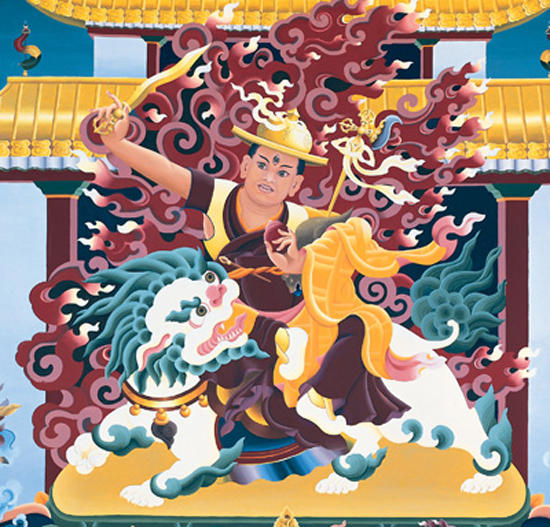
by Brad Warner
Every once in a while I meet someone who says she became interested in Buddhism because Buddhists were never involved in religious persecution or holy wars. I always hate to break the news to them that this is, unfortunately, not entirely true.
It is true that Buddhism has been largely free of really large scale wars and persecutions based directly on religion such as the Crusades, the Spanish Inquisition, the conflicts in Israel and Northern Ireland and so on. In fact, if you go to Wikipedia’s page on religious persecutions and religious wars, you find no major persecutions by Buddhists, and the only religious war listed involving Buddhists is an uprising of the Buddhist majority in Vietnam against the pro-Catholic policies of Ngo Dinh Diem in 1966. Not exactly a war in which one religion sought to conquer or convert another by force.
But that doesn’t mean that just because someone declares him or herself to be Buddhist that the person is free from ever behaving like a dick. Brian Victoria caused a lot of people to question their belief in perpetually peaceful Buddhists when he published Zen At War, a book that examined how Buddhist institutions in Japan were co-opted by the government to support the cause of nationalistic violence during World War II – much like the Catholic church was similarly co-opted by the Nazis. Even today similar stuff keeps happening.
The latest of those who would try to use Buddhism as a way of promoting intolerance and violence on a national level is U Wirathu, an ultra-nationalist Buddhist monk in Burma who has been accused of inciting violence against Muslims in his country as leader of the “969 movement.” He has become known as the “Buddhist bin Laden” for his activities. In Sri Lanka, Sinhalese Buddhists have formed what they call the “Buddhist Strength Force,” another group seeking to persecute Muslims in the name of Buddhism. Just last week three Bhutanese Buddhist monks were accused of raping a teenage girl in India. You can read about all of these incidents in detail here. I’m sure this won’t be the last we’ll see of violence and stupidity in the name of Buddhism.
The easiest response to all of this would be to say that those involved weren’t really Buddhists, even if they were legitimately ordained since they failed to understand the most basic teachings of Buddhism. Some people have argued that certain verses in the Qur’an or the Bible can be used to justify violence and religious intolerance. But it would take a lot of work to find anything similar among the Buddhist literature, although the Buddhist sutras far outnumber the canonical religious writings of Christianity or Islam, so I’m sure someone could dig something out of there if they tried hard enough. There’s nothing I’m aware of but there are mountains of sutras out there and you could probably find some little snippet that sounds nasty if you wanted to sift though a lot of stuff.
Even so, none of the reports I’ve seen have mentioned any of these Buddhist bully-boy organizations citing the scriptures and teachings of Buddhism as a justification for their actions the way other religions often do. The closest thing I’ve come across to that is that the Sri Lankan group apparently opposes the Muslim practice of halal butchering and meat preparation as being against the Buddhist teachings of non-violence toward animals. But this seems to me like a real reach for some kind of scriptural justification. And I don’t see how you can enforce non-violence against animals by engaging in violence against humans.
Some folks were getting upset over the fact that His Holiness the Dalai Lama was not speaking out more strongly against the Buddhist based violence in Burma and Sri Lanka. However, this is actually a smart move on his part. Most Buddhists in Burma and Sri Lanka don’t regard the Dalai Lama as their leader. Far from it. They regard him something like the way Irish Protestants view the Pope, as kind of an interloper who has no business telling them about their religion. It would only incite more violence if the Dalai Lama took a strong stand.
Generally we Americans and Europeans don’t know much about Buddhism, so we make a lot of incorrect assumptions. This is excusable because all we have to go on is what we get from our woefully ill-informed mass media and cartoonish references in pop culture.
But interestingly it’s we Westerners who seem to grasp the basics of Buddhism enough to see the innate absurdity of stuff like the Buddhist persecutions in Sri Lanka and Burma better than lots of the folks in those countries. While I’m sure there are plenty of Burmese and Sri Lankan Buddhists who know how ridiculous this is, this stuff wouldn’t be happening at all unless there were also plenty of people in those countries who consider themselves Buddhists but really have no clue at all what the whole point of Buddhism is.
That’s pretty sad. But it’s no sadder than Christians murdering Muslims in their quest to spread Jesus’ philosophy of love or Muslims murdering Christians to spread Mohammed’s message of brotherhood. Religions divide people. And when Buddhism is viewed as a religion, it can be used almost effectively as any other as an excuse for viciousness and just plain human foolishness. You have to stretch things a bit, but it can be done. Human beings are good at that. We’ll find a way.
But the rest of us don’t have to accept it. We can and should point out how ridiculous this is. If we can shame the assholes persecuting others on the basis of Buddhism by knowing their religion better than they do, then we ought to do just that. Not in a malicious way, mind you. But it might be useful to subtly make some of the folks over there who are participating in this kind of nonsense aware that there are people far away who actually take “their” religion more seriously than they apparently do.
It’s disappointing to discover that even those proclaiming themselves to be Buddhists can still act like real jerks. But people are what they are. Acting like a jerk, however, is definitely not what the Buddha taught.




